Welcome to Matrix Education
To ensure we are showing you the most relevant content, please select your location below.
Select a year to see courses
Learn online or on-campus during the term or school holidays
Learn online or on-campus during the term or school holidays
Learn online or on-campus during the term or school holidays
Learn online or on-campus during the term or school holidays
Learn online or on-campus during the term or school holidays
Learn online or on-campus during the term or school holidays
Learn online or on-campus during the term or school holidays
Get HSC Trial exam ready in just a week
Get HSC exam ready in just a week
Select a year to see available courses
Science guides to help you get ahead
Science guides to help you get ahead
Do you struggle to feel engaged with some of your subjects? Don't worry, you're not alone. In this article, Sefton High School Student and Matrix Graduate Tammy Dang shares her secrets for learning to love a weak subject so she could nail it.

Join 75,893 students who already have a head start.
"*" indicates required fields
You might also like

Join 8000+ students each term who already have a head start on their school academic journey.
In this article, Tammy Dang shares her hacks for how she went from lacking interest in English to acing it at school with an E4 for Extension 1! In her guest blog post, Tammy gives her steps for conquering her disinterest to ace her weakest subject!
Name:
Tammy Dang
School:
Sefton High School
University Course:
Combined Bachelor of Media (Screen and Sound Production) / Bachelor of Law at UNSW
There was one great problem that I noticed during Year 11; I was not performing well for the subjects that I had little interest in.
During Year 11, I was averaging a 76% for Ext 1 English. Honestly, I did not have a genuine interest in studying ‘how great and mighty Odysseus was’, or ‘how annoying is Penelope’. I knew I couldn’t carry these marks into the HSC year.
Either I dropped the subject, or I really need to pull up my socks and put a real effort into raising my marks.
And in our first HSC assessment task, I achieved 92.5% for English Ext 1.
And by the end of Year 12, I was ranked 3rd at school in English Extension 1. I finished with an E4!
I was just as shocked. So, how did I manage to raise my marks up by nearly 15%?
There are a few things that I changed!
As opposed to just sitting down in class, and listening to my classmates, I actively immersed myself in class discussions. I found this extremely helpful in building my interest in the subject, and solidifying & extending my knowledge.
When we share our ideas, we begin to recognise different perspectives. We are forced to question ourselves, defend ourselves, and relate things to the real world.
In doing all of this, we begin to form opinions, build a stronger argument and understanding of your text, and develop a genuine interest in the subject (even if you don’t like the text!).
And this leads to…
Through all the class discussions and research into the texts you are studying, you will evidently form some sort of an opinion. Just know that this is NEVER wrong.
I know in junior years, I was always scared to write about anything that was different from what my teacher had told me in class.
But this ‘fear’ changed this year.
My Extension 1 teacher had badgered us with, “Believe in what you write!”, “Form an opinion, people!”.
As I begin to create arguments that I genuinely believed in, I also noticed myself becoming more interested in the subject.
I was more confident in my writing. And I loved what I wrote. And that was something that changed the way I viewed English forever.
I know this seems quite obvious but in reality, it really isn’t. What most of us find ourselves doing, is that we’re too afraid to let go of our perfectly crafted, pre-prepared essays in the actual exam, and we forget to directly address the question.
You are not regurgitating a memorised essay. You are being tested on your ability to adapt your knowledge to a question.
So, when you are writing an essay, ALWAYS use KEYWORDS from the rubric and text.
REPEAT. REPEAT. REPEAT.
It doesn’t hurt to hammer these keywords home a bit more.
Learn how to write Band 6 HSC responses in English
Expert HSC teachers, detailed feedback, and comprehensive resources. Learn with Matrix+ online English courses.
DO WHAT’S BEST FOR YOU!!!
By now, you should know what works or what doesn’t.
Different people will find different things useful, eg. notes, formula sheets, practice essays, mindmaps etc.
I’ll show you some of my study strategies that I personally found useful (it may or may not work for you! But check it out).
Typed-Up Notes: Tables and pages unpacking techniques and analysis of texts (prepared accordingly to the module).
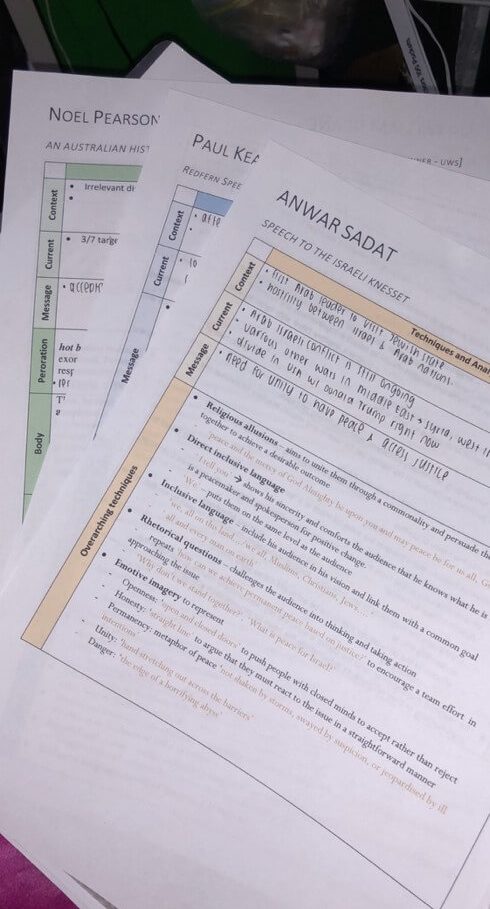
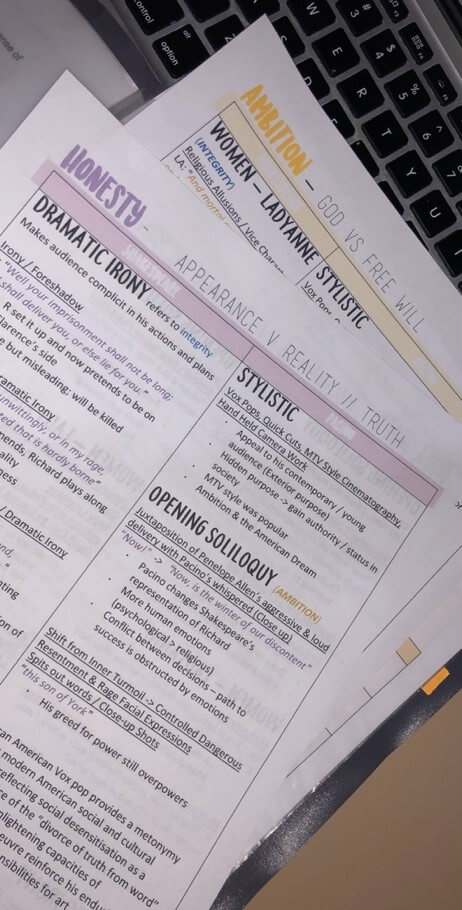
Master Essays – B generic essay that can be adapted.
This essay is NOT to be memorised word for word, but it works more as a GUIDE to help you formulate sentences and analysis that you can incorporate during exams.
Pre-prepared Creative: A creative that could be moulded to the stimulus provided.
Master Essays & Pre-prepared Creative: I wrote 3 master essays that each have a different focus and structure and a pre-prepared creative that can be adapted.
Notes of Formulas: Each time we finished a topic in class, I would write down the important formulas, tips & tricks, and methods to certain questions that I am likely to forget.
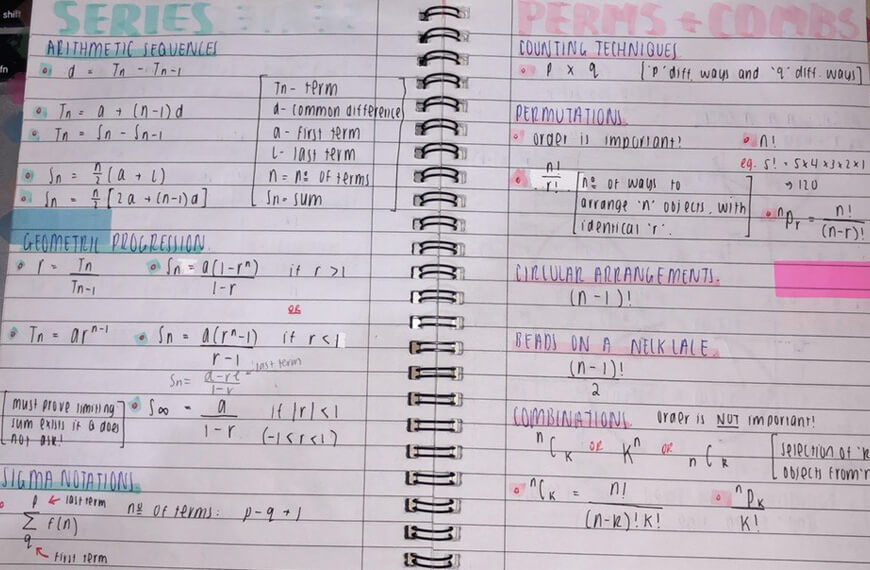
DO LOTS OF PAST PAPERS!: For maths, practice makes perfect!
Try to do at least 1 paper per week, then as you approach exam periods, do more.
Don’t neglect its importance!!
Notes: I wrote notes accordingly to how we were going to be tested on it for the HSC.
For example:
Essay Scaffolds: This is very useful for the topics that you will be asked to write essays. I often handwrote them, but I also type some up.
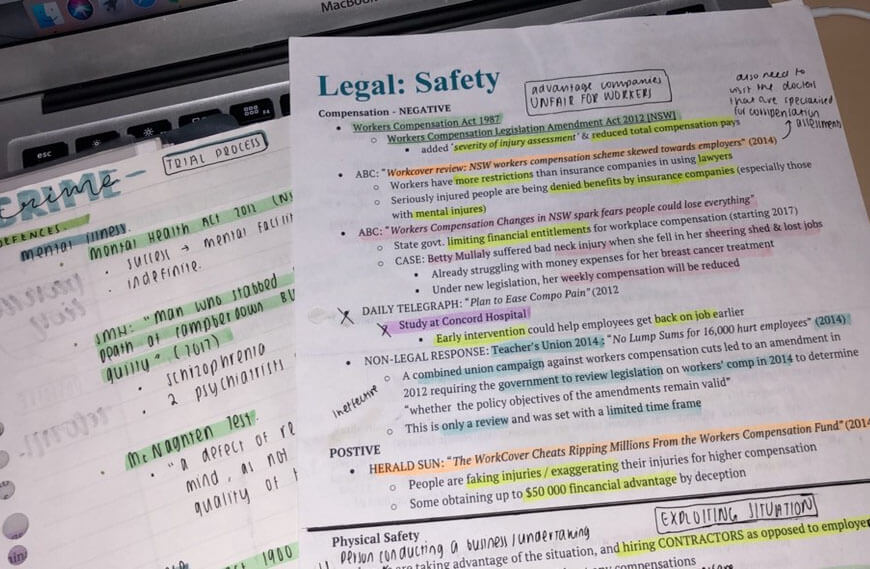
Textbooks
To be honest, I did not write notes for this subject (although many did find notes useful since it is so content heavy).
Instead, I read through numerous textbooks
Many textbooks that the schools distribute are very heavy in content and are very detailed.
Read over them. Understand their content. Remember the examples.
But don’t use them as revision for exams. It takes too long, and it’s too much for your brain.
INSTEAD…
Use Excel to have a quick summary or revision cheatsheet
Excel makes for a very simple textbook. They give short summaries of each dot point and provides space on the side to see what you remember or add more information. I found this useful for revision.
Typed-Up Notes: I had notes on a variety of artists to prepare myself for a variety of essay questions. I would include, analysis of their paintings from different frames, details about their artmaking practice, and details on the conceptual framework.
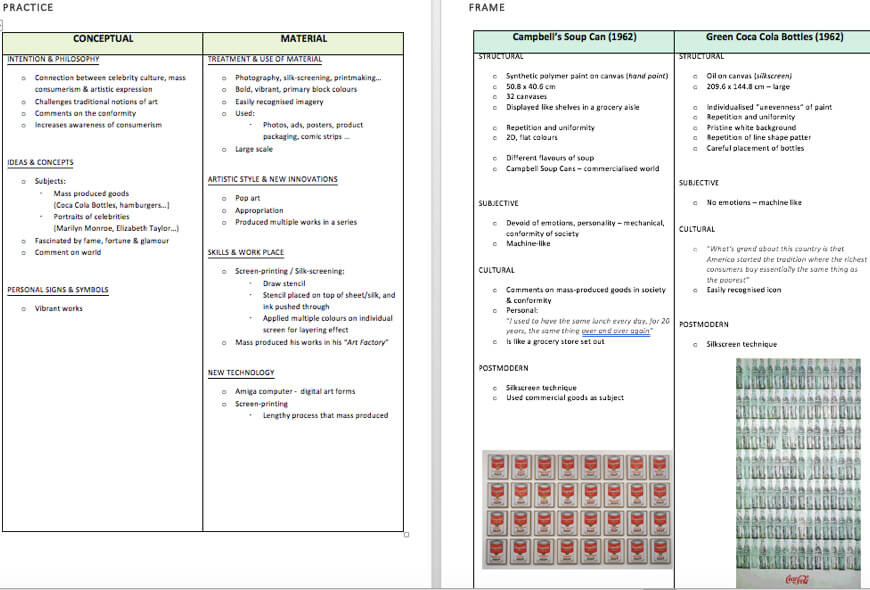
The MAIN POINT that you should get out of this is that there are MANY different ways to study. Depending on YOU, and depending on the SUBJECT and its requirements, prepare yourself in different ways.
I have many regrets about my HSC year, but If I had my time again the two things I would definitely do are:
1. START EARLIER – You think you have time, but in a blink of an eye, it’s already a week before your exams and you haven’t had enough time to revise and practice them.
Time is always FASTER than you think. Use it effectively.
2. PRACTICE MORE – There have been so many times when I’m cursing at myself for not giving myself enough time to practice. I would revise up until the last minute without doing any past papers.
This is not the best use of time, because practising is always important!
Even though my weakness was English. It will be different for you.
Always choose the subjects that YOU are interested in.
Sure, it is important to do subjects that your course requires, but honestly, you will change your mind numerous times over the next 2 years!
If you HATE your subjects, you will NOT do well in it. There needs to be a genuine interest in the subject because then you will WANT to put in the effort to learn the content and practice it.
And always remember, at the end of the day, it is not your ATAR that matters, it is your progress.
If you continuously learn, and strive to become a better person, whether it be setting goals, or being more productive, you are doing great.
Just focus on yourself, and improving yourself, and everything will turn out right in the end.
Written by Matrix English Team
The Matrix English Team are tutors and teachers with a passion for English and a dedication to seeing Matrix Students achieving their academic goals.© Matrix Education and www.matrix.edu.au, 2025. Unauthorised use and/or duplication of this material without express and written permission from this site’s author and/or owner is strictly prohibited. Excerpts and links may be used, provided that full and clear credit is given to Matrix Education and www.matrix.edu.au with appropriate and specific direction to the original content.